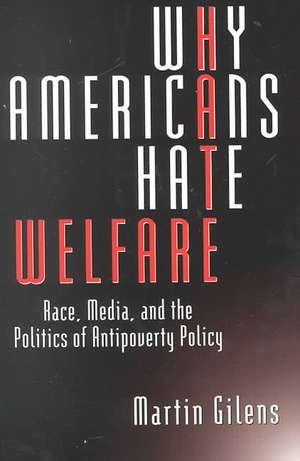Why Americans Hate Welfare: Race, Media, and the Politics of Antipoverty Policy: Studies in Communication, Media, and Public Opinion
Autor Martin Gilensen Limba Engleză Paperback – 10 oct 2000
Tackling one of the most volatile issues in contemporary politics, Martin Gilens's work punctures myths and misconceptions about welfare policy, public opinion, and the role of the media in both. Why Americans Hate Welfare shows that the public's views on welfare are a complex mixture of cynicism and compassion; misinformed and racially charged, they nevertheless reflect both a distrust of welfare recipients and a desire to do more to help the "deserving" poor.
"With one out of five children currently living in poverty and more than 100,000 families with children now homeless, Gilens's book is must reading if you want to understand how the mainstream media have helped justify, and even produce, this state of affairs." —Susan Douglas, The Progressive
"Gilens's well-written and logically developed argument deserves to be taken seriously." —Choice
"A provocative analysis of American attitudes towards 'welfare.'. . . [Gilens] shows how racial stereotypes, not white self-interest or anti-statism, lie at the root of opposition to welfare programs." -Library Journal
"With one out of five children currently living in poverty and more than 100,000 families with children now homeless, Gilens's book is must reading if you want to understand how the mainstream media have helped justify, and even produce, this state of affairs." —Susan Douglas, The Progressive
"Gilens's well-written and logically developed argument deserves to be taken seriously." —Choice
"A provocative analysis of American attitudes towards 'welfare.'. . . [Gilens] shows how racial stereotypes, not white self-interest or anti-statism, lie at the root of opposition to welfare programs." -Library Journal
Din seria Studies in Communication, Media, and Public Opinion
-
 Preț: 254.03 lei
Preț: 254.03 lei -
 Preț: 142.55 lei
Preț: 142.55 lei -
 Preț: 272.65 lei
Preț: 272.65 lei -
 Preț: 262.38 lei
Preț: 262.38 lei -
 Preț: 230.50 lei
Preț: 230.50 lei -
 Preț: 290.34 lei
Preț: 290.34 lei -
 Preț: 233.29 lei
Preț: 233.29 lei -
 Preț: 234.86 lei
Preț: 234.86 lei -
 Preț: 196.13 lei
Preț: 196.13 lei -
 Preț: 259.08 lei
Preț: 259.08 lei -
 Preț: 289.19 lei
Preț: 289.19 lei -
 Preț: 372.38 lei
Preț: 372.38 lei -
 Preț: 265.30 lei
Preț: 265.30 lei -
 Preț: 226.67 lei
Preț: 226.67 lei -
 Preț: 244.45 lei
Preț: 244.45 lei -
 Preț: 258.14 lei
Preț: 258.14 lei - 13%
 Preț: 202.07 lei
Preț: 202.07 lei
Preț: 239.27 lei
Nou
Puncte Express: 359
Preț estimativ în valută:
45.78€ • 47.81$ • 37.81£
45.78€ • 47.81$ • 37.81£
Carte tipărită la comandă
Livrare economică 15-29 aprilie
Preluare comenzi: 021 569.72.76
Specificații
ISBN-13: 9780226293653
ISBN-10: 0226293653
Pagini: 303
Ilustrații: 26 line drawings, 32 tables
Dimensiuni: 152 x 229 x 20 mm
Greutate: 0.42 kg
Ediția:1
Editura: University of Chicago Press
Colecția University of Chicago Press
Seria Studies in Communication, Media, and Public Opinion
ISBN-10: 0226293653
Pagini: 303
Ilustrații: 26 line drawings, 32 tables
Dimensiuni: 152 x 229 x 20 mm
Greutate: 0.42 kg
Ediția:1
Editura: University of Chicago Press
Colecția University of Chicago Press
Seria Studies in Communication, Media, and Public Opinion
Cuprins
Preface
Introduction
1. The American Welfare State: Public Opinion and Public Policy
2. Individualism, Self-Interest, and Opposition to Welfare
3. Racial Attitudes, the Undeserving Poor, and Opposition to Welfare
4. Assessing Alternative Explanations: Statistical Models of Welfare Attitudes
5. The News Media and the Racialization of Poverty
6. Media Distortions: Causes and Consequences
7. Racial Stereotypes and Public Responses to Poverty
8. Beyond the Attitude Survey: Public Opinion and Antipoverty Policy
9. The Politics of the American Welfare State
Appendix
Notes
Bibliography
Index
Introduction
1. The American Welfare State: Public Opinion and Public Policy
2. Individualism, Self-Interest, and Opposition to Welfare
3. Racial Attitudes, the Undeserving Poor, and Opposition to Welfare
4. Assessing Alternative Explanations: Statistical Models of Welfare Attitudes
5. The News Media and the Racialization of Poverty
6. Media Distortions: Causes and Consequences
7. Racial Stereotypes and Public Responses to Poverty
8. Beyond the Attitude Survey: Public Opinion and Antipoverty Policy
9. The Politics of the American Welfare State
Appendix
Notes
Bibliography
Index















